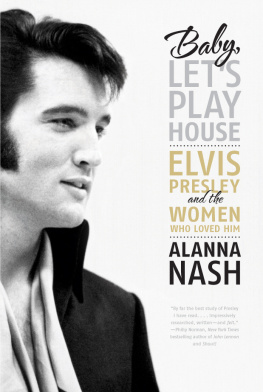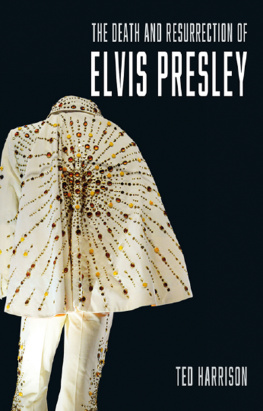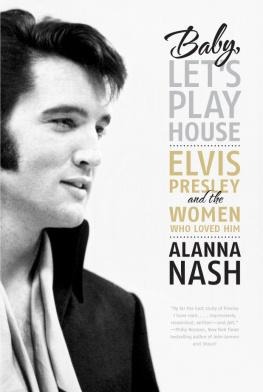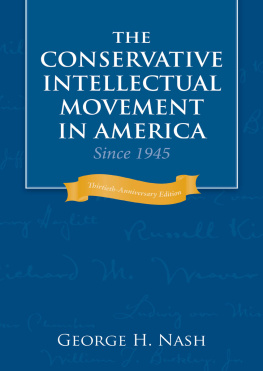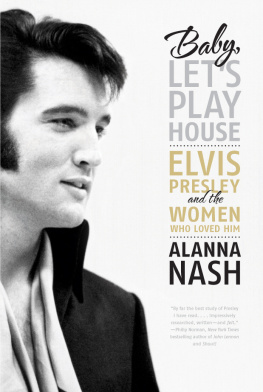No matter if he were young and thin, a vision in gold lam, or middle-aged and paunchy, stretching the physical limits of his gabardine jumpsuit, Elvis Presley never failed to affect his female audiences the same way: He drove them crazy. The mere sight and sound of him made women around the world drop all inhibitions, and to publicly behave as they never would otherwise, giving in to screams, fainting, and wild exhibitions of frenzy.
Sometime during the 1970s, when Elvis was a Las Vegas staple, Jean Beaulne, who had started his entertainment career in the 1960s as one-third of Les Baronets, Montreals answer to the Beatles, was flabbergasted to see the reaction of one woman who attended Elviss dinner show at the Las Vegas Hilton.
In between songs, some twenty-five minutes into the performance, as Elvis shook hands and kissed the women who crowded up near the stage and hoped to receive one of the multitude of scarves he ceremoniously dispensed, We heard a woman yelling in the back of the room, and then we turned to see her hopping from one tabletop to the other to get up to Elvis.
He was so surprised! He made a face, like, Wow, what happened? Everybody in the room was laughing. Then she put her arms around his neck and kissed him. He smiled and gave her a scarf, and then she turned around and did the same thing, jumping from one table to the other. Everybody started to applaud.
Yet Elvis was never more potent than at the beginning of his career, before the patently routine scarf offering, when he was dangerous, revolutionary, and nobody knew what to expect.
On November 23, 1956, two days after the nationwide release of Love Me Tender, Elviss first film, a high school photographer named Lew Allen covered a Presley concert in Cleveland and was astonished at what he saw.
There was a row of policemen standing in front of the stage, and girls would start at the back of the auditorium with their eyes on Elvis, and run as fast as they could [toward the stage]. Theyd bounce off these policemens stomachs, and then bounce back four or five feet and land on their rear ends. And they would still have their eyes on Elvis. It was amazing. They did it repeatedly, like flies running into a light bulb.
Allen may have been dumbfounded, but as blues songwriter Willie Dixon teased, The men dont know/But the little girls understand.
Nineteen fifty-six was a great year, remembers Presleys seminal guitarist, Scotty Moore. The crowds had gotten very large, and it would get so loud that it would just cancel out all the sound onstage. The best way I can describe it is like when you dive into the water and you hear the phasing, the rush of the water. Actually, on most songs, if we couldnt hear him, wed know where he was at by his body language. We were the only band I know literally directed by an ass.
As Elvis worked out his own private fantasies onstage, an entire nation would take his directive, even if it was initially slow to accept it.
Elviss sexual history, the rock critic Robert Christgau has written, inflects the myth of a feral young Southerner whose twitching hips were the point of articulation for a seismic shift in American mores.
The exact moment of that shift, according to some Elvisologists, arrived on June 5, 1956, when the twenty-one-year-old Presley appeared on The Milton Berle Show. It was not Presleys television debut. But in his previous network appearances, when his guitar had largely restricted his movements, Elvis relied more on attitude, sinking eyelids, a curled lip, sideburns, and a husky voice that rose from somewhere below the waist, as newsman Peter Jennings later put it, to convey his libidinous intent. Now on the Berle show, performing a lascivious rendition of Hound Dog, he moved in a way that was completely unfathomable for a white boy of the 1950s, punctuating a drawn-out, half-time ending with the burlesque bumps and grinds of a female stripper. At one point in the flurry of sexual shakes and shimmies, he seemed to hump the microphone, and in a futuristic salute to his would-be son-in-law, Michael Jackson, almost grab his crotch.
The following day, newspapers across the nation bellowed their outrage at this obscene purveyor of the fledgling art form called rock and roll, Ben Gross of the New York Daily News decrying that popular music had reached its lowest depths in the grunt and groin antics of one Elvis Presley.
Forty years later, in his book, Elvis After Elvis: The Posthumous Career of a Living Legend, Gilbert B. Rodman, an assistant professor of communications at the University of South Florida, would label Elviss performance on the Berle show a message so shocking that it seemed that Western civilization could not possibly survive its utterance, and call it the moment when rock and roll was recognized as a threat to mainstream U.S. culture.
Such intellectual hand-wringing brings to mind the old black-and-white film clips of grim-faced men warning of the dangers of rock and roll, urging decent, God-fearing Americans to smash any copies of the Devil music they could find, lest the nations youth be corrupted and damned to hell.
Yet despite on which side of the moral fence one sits, there is no arguing that if Frank Sinatra was the first popular singer to make women swoon with the thoughts of romantic love, Elvis moved those obsessions lower, to erotic regions no mainstream performer had dared acknowledge with such ferocious abandon.
Today, Elviss movements seem tame to younger generations raised on incendiary films and videos. But few rock and rollers of any era have moved with such salacious insouciance, writes Christgau. In 1956, the cantilevered poetry of Elviss swiveling midsection, coupled with the eye-popping sight of his left leg working like a jackhammer, quickly led journalist Pinckney Keel of the Jackson [Mississippi] Clarion-Ledger to dub him Elvis the Pelvis, a term Elvis despised, calling it, One of the most childish expressions Ive ever heard coming from an adult.
That same year, on August 6, 1956, Tampa journalist Paul Wilder, a crony of Elviss nefarious manager, Colonel Tom Parker, conducted one of the few, and most famous, interviews with Elvis for TV Guide. Backstage before the show in Lakeland, Florida, Wilder got Elviss dander up when he read him a review from the Miami Herald that criticized both his voice and his guitar playing. What remains, unfortunately, the article concluded, are his pelvic gyrations. And thats the core of the whole appealsex stimulation.
Any answer to that one? Wilder asked.
Well, I dont roll mywhatd he call itpelvic gyrations, an indignant Elvis replied. My pelvis had nothin to do with what I do. I just get kinda in rhythm with the music. I jump around to it because I enjoy what Im doin. Im not tryin to be vulgar, Im not tryin to sell any sex, Im not tryin to look vulgar and nasty. I just enjoy what Im doin and tryin to make the best of it.
It was a fib, of course. Even then, he knew the power he had onstage and off, the way he could charm the pants off a snake, in novelist Bobbie Ann Masons Southern expression.
She touched my hand, what a chill I got
Her lips are like a volcano thats hot
Im proud to say shes my buttercup
Im in love
Im all shook up
Mm, mm oh, oh, yeah, yeah!
For a man who was literally pawed, groped, scratched, and had his clothes ripped away by women for his entire twenty-three-year career, Presley demonstrated a remarkable tolerance for his audience. He rarely seemed to resent their overexuberant physical presence, their endless requests for autographs, or worse, the way their desire to possess him kept him a virtual prisoner in hotel rooms and at home in his beloved Graceland. In that regard, he stands almost alone in the pantheon of great rock stars, many of whom despise the very people who made them.

